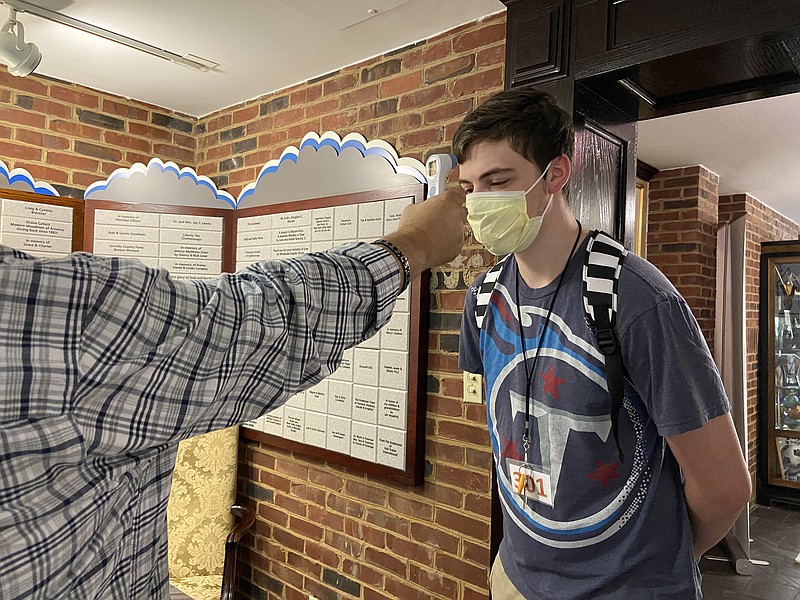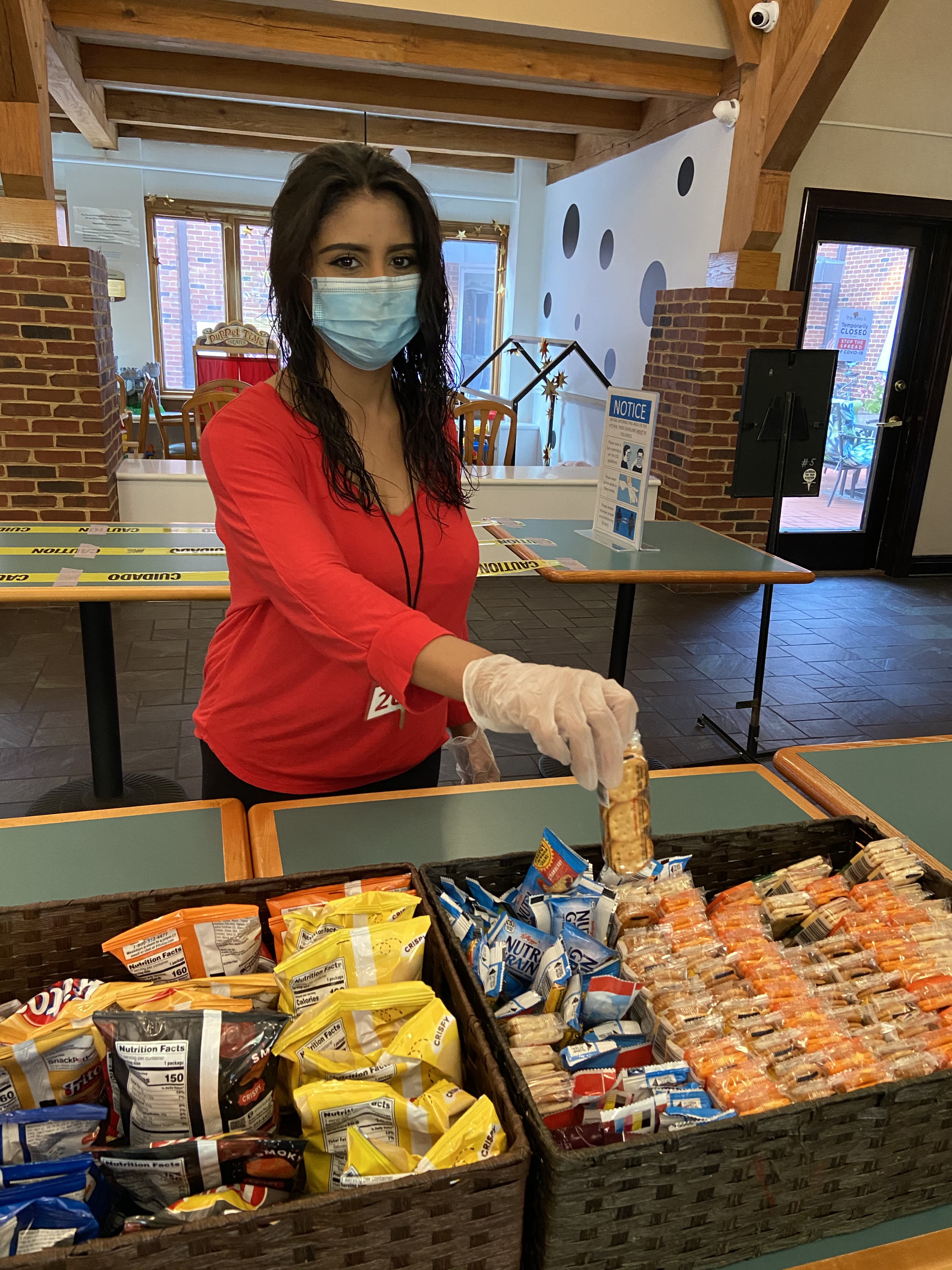Julianna Vargas was born 13 weeks earlier than she should have been.
She can't be bottle fed because the milk goes into her lungs instead of her stomach. Even when milk doesn't invade her lungs, she can't breathe well because the organs are underdeveloped.
Her mother, Abigail Vargas, is by her side from about 8 a.m. until 4 p.m. every day in the Neonatal Intensive Care Unit at Children's Hospital at Erlanger. Julianna rests in a bassinet under a clear plastic shield, so Vargas can't touch her 2-month-old baby.
Vargas also must wear a face mask at all times. The safety precautions are a response to the coronavirus, of course, but also to prevent virus or bacteria of any kind getting to Julianna.
When Vargas leaves the hospital, she heads to the Ronald McDonald House on Central Avenue. There, she is fed, has a place to sleep and bathe and have her laundry done. Perhaps most importantly, it's a place where she can release some of the anxiety that sits on her shoulder like a gargoyle.
"It's such a blessing. It's one less stress to worry about," says Vargas, who lives in Winchester, Tennessee. "They're super-sweet and they take a lot of precautions. I enjoy the way that they treat everybody."
At 365 locations around the world, the Ronald McDonald House offers refuge to parents whose child is in the hospital, either severely sick or suffering from terrible injuries. But in March, the novel coronavirus threw a mammoth wrench into the gears of Houses worldwide. Chattanooga's location was no different.
"I think probably the 'Holy cow!' was having to weigh the safety of our staff and their families with the need to continue operations, even if it was on a limited basis," says Jane Kaylor, president and CEO of Ronald McDonald House Charities of Greater Chattanooga.
Like so many other places around Chattanooga - and the world, for that matter - the House had to be light-footed, ready to make changes quickly.
"There was confusion at first on how we would be able to adjust as an organization in order to continue providing for the families that rely on us," says Bethany Ramsey, communication coordinator for the House.
Cleaning and disinfecting ramped up beyond what staff does on a regular basis. Face masks are required in common areas and daily temperature checks are taken of everyone.
In its first phase of reopening, the 28-bedroom house limited the number of parents who could stay there. At first, seven bedrooms were reopened, Kaylor says. Another seven were recently added.
"There's not much difference except we can open up more rooms to families," she says of the phased approach.
Currently, five families are staying in the House. In a typical year, it welcomes about 550 families over 12 months, Kaylor says. But this is far from a typical year.
One of the most noticeable changes at the House is the absence of volunteers, who currently are not allowed in. A timeline to bring them back had not yet been settled on at press time.
There usually are between eight to 10 volunteers per month, and with them out of the picture, the House's 17 regular staff members must take up the slack. They're working rotation shifts - three shifts a week with three to four staffers at each - to cover the facility 24/7 while also performing many tasks the volunteers usually handle.
It's a significant number of jobs and includes working in the front office, restocking the kitchen and bathrooms, helping with laundry, managing the House on weekends, checking in visitors and providing meals for the families, says Kaylor.
"We have never been without volunteers before and their absence has been like a sore that won't heal," she says. "We can't wait until we can welcome our volunteers back."
Changes to the Chattanooga Ronald McDonald House began on March 21, when Houses worldwide shut down while the coronavirus' effects on staff members, volunteers and families were evaluated.
"With a medical advisory board comprised of contacts from all over the world, a very comprehensive plan was rolled out for House programs to be reinstated after a six-week pause," Kaylor says. "The plan required input from our hospital partners, local health departments and government officials, in addition to submitting a very detailed plan for how our organization would manage requirements of cleaning, social distancing, staffing without volunteers, and it required the approval of our local board of directors."
Under new rules, families staying in the Houses cannot travel anywhere except the hospital and the Ronald McDonald House. They must stay mostly in their rooms. Every hour, staff members make a disinfecting run through the entire building.
Currently, guest rooms have mini-refrigerators and microwaves to minimize use of the common kitchen. Instead of family-style meals often prepared by volunteers, all food is packaged in single servings so families can pick them up and take them to their rooms.
"I'm sure the families feel more isolated since they have to stay in their guest rooms and the common areas are closed. On the other hand, that's all they know. The staff probably feels it more since they know that this isn't our 'normal,'" Kaylor says.
None of the rules bother Katelyn Basham, who has been in Chattanooga since May 5 and staying at the House for several weeks. Residents of McMinnville, she and her husband Dustin came to Chattanooga after their 1-month-old son Chase was born about eight weeks prematurely.
"I wound up having an emergency C-section after he was unresponsive on an ultrasound," she says. "He suffered oxygen and blood loss and his liver was slightly damaged."
Now in the Neonatal Intensive Care Unit at Children's Hospital at Erlanger, Chase is doing much better, she says. Once he puts a bit more weight on, he'll be able to go home, his father adds.
The Ronald McDonald House is a source of comfort while they wait.
"I enjoy staying here because it's just like at home," Basham says. "We don't feel the need to go out anywhere.
"They take care of us very well."

